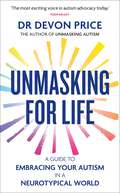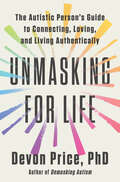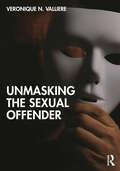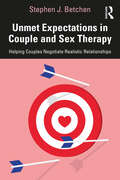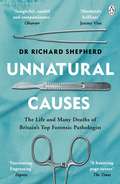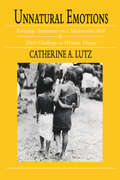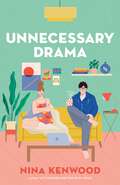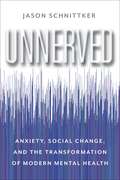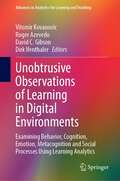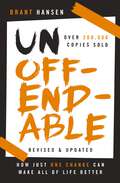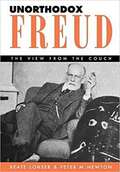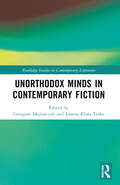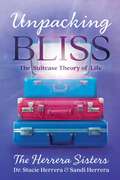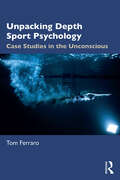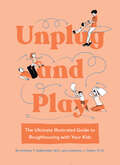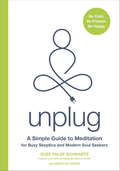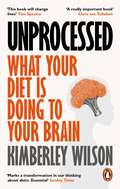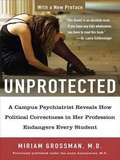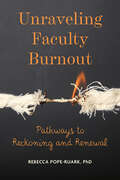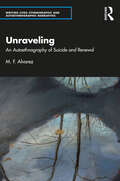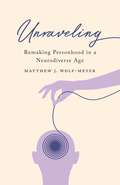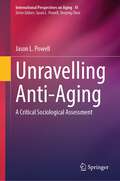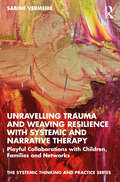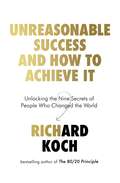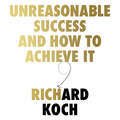- Table View
- List View
Unmasking for Life: A Guide to Embracing your Autism in a Neurotypical World
by Devon Price'Devon Price is the most exciting, revolutionary voice in autism advocacy today.'-Fern Brady, comedian and author of Strong Female Character'Deeply insightful and empowering, illuminating a path for those of us searching for authentic connections and relationships [...] This is the book I desperately needed.' -Emily Katy, author of Girl Unmasked***Live your best, unashamedly unmasked Autistic life with this invaluable resource featuring tools for navigating friendships, family, work, love, and life, from the author of Unmasking Autism.So you've discovered what 'masking' is, how you're doing it, and the potential of embracing your neurodiversity. Now what?Most masked Autistics have spent a lifetime being told how to perform neurotypically: how to behave, how to carry themselves, what to feel, and how to live. With his previous book, Unmasking Autism, Dr. Devon Price has given them the space and confidence to unmask and embrace their neurodiversity. But no matter where you are in the unmasking process, there is still work to be done. Because Autistic people often fear change, struggle to process unfamiliar situations, and have trauma histories that have conditioned them to avoid conflict, they don't always know how to transform their inner revelations into outer realities. They need more than internal healing - they need practical tools to translate acceptance into assertiveness and interpersonal effectiveness.In this book, Devon Price helps you advocate for your needs and invent new ways of living, loving and being that work for you, using five key skills:· Acceptance of change, loss, and uncertainty· Engagement in productive conflict, discussion, and disagreement· Transgression of unfair rules, demands, and social expectations· Tolerance of distress, disagreement, or being disliked· Creation of new accommodations, relationship structures, and new ways of livingWith powerful insights and transformative resources, Unmasking for Life is a practical guide to living a fully realised Autistic life.***PRAISE FOR UNMASKING AUTISM:'Outstanding.'' -Fern Brady, author of Strong Female Character'Reading this felt like being at home - I didn't realise how much I masked. What an incredible book that I know will be re-read many times over.' -Dr Camilla Pang, author of Explaining Humans'A powerful argument for radical self-acceptance applicable to all readers.' - Los Angeles Times
Unmasking for Life: The Autistic Person's Guide to Connecting, Loving, and Living Authentically
by Devon Price PhDLive your best, unashamedly unmasked Autistic life with this invaluable resource featuring tools for navigating friendships, family, work, and love, from the author of Unmasking Autism.&“Unmasking for Life should be read by not only autistic people but their loved ones, to ensure they facilitate a truly fulfilling life.&”—Eric Garcia, author of We&’re Not Broken: Changing the Autism ConversationMost masked Autistics have spent a lifetime being told how to perform neurotypically: how to behave, how to carry themselves, what to feel, and how to live. With his previous book, Unmasking Autism, Devon Price, PhD, has given them the space and the tools to unmask and embrace their neurodiversity. But no matter where you are in the unmasking process, there is still work to be done. Unmasking is more than just a personal process of self-acceptance, after all—it also requires figuring out how to move comfortably throughout life building friendships, nurturing family, pursuing love, finding a means of survival, and expressing oneself on one&’s own terms. In order to live a brilliantly unashamed Autistic life, you need more than internal healing—you need practical tools of assertiveness and interpersonal effectiveness, and solutions to the problems of ableism and inaccessibility. Enter Unmasking for Life, which provides the resources to help you advocate for your needs and invent new ways of living, loving, and being that work with your disability rather than against it. You&’ll learn how to develop five key skills for living unmasked in all areas of life:• Acceptance of change, loss, and uncertainty• Engagement in productive conflict, discussion, and disagreement• Transgression of unfair rules, demands, and social expectations• Tolerance of distress, disagreement, or being disliked• Creation of new accommodations, relationship structures, and new ways of livingUnmasking for Life will help validate and support you so you can move beyond unmasking your Autism and begin unmasking your world.
Unmasking the Sexual Offender
by Veronique N. ValliereThis book unmasks the sexual offender by providing clear, comprehensible information about the motivations, techniques, and dynamics of sexual offenders and their behavior. It not only explores the biases and myths that the reader may rely upon to understand deviance but also explains pathways to offending, the distorted thinking and relating that offenders engage in, and the ways offenders manipulate and exploit others. Sexual offenders are surrounded by mythology, fascination, and revulsion. People who commit sexual offenses present difficult and complicated issues interpersonally, as well as in treatment and management; denial, victim-blaming, aggression, and blatant chronic deception are inherent in interactions with them. Unfortunately, the failure to truly understand their motives and techniques helps provide excuses for and further camouflage of their deviance. The first part of the text explores the presumptions commonly adopted about sexual offenders and shows how misinformation supports the inappropriate behavior of the sexual offender. The second section focuses on exposing the sexual offender using straightforward language and tangible examples. A final, third section includes safety and management strategies for dealing with sex offenders for those both inside and outside the realms of law enforcement and offender supervision. This book is intended for anyone interested in learning about sexual offenders. It is useful for both professionals and non-professionals, including students, paralegals, victim advocates, and others involved in the criminal justice system or mental health field.
Unmet Expectations in Couple and Sex Therapy: Helping Couples Negotiate Realistic Relationships
by Stephen J. BetchenStephen J. Betchen illuminates unmet expectations as one of the leading causes of relationship problems, offering an integrative, systemic, and conflict-oriented treatment model that will help both therapists and couples develop happier and more realistic relationships. This clinical guide helps therapists provide couples with the ability to recognize the origin of their expectations and when their expectations might be realistically or unrealistically too high or low. It defines and demonstrates the complexity of what met or unmet expectations are, identifying common symptoms as anger, incessant bickering, anxiety, disappointment, disillusionment, and sadness. Chapters outline how to determine the origin and impact of unmet expectations before discussing how and why we choose our partners that do or do not meet our needs. Addressing sociocultural factors in depth, Betchen provides tools to assess and treat both sexual and non-sexual symptoms and includes a chapter on how to manage the issue of when a therapist doesn’t meet the expectations of their clients. The book is invaluable for therapists who work with couples as well as trainees and supervisors in couple, family, and sex therapy graduate and post-graduate programs.
Unnatural Causes: 'An absolutely brilliant book. I really recommend it, I don't often say that' Jeremy Vine, BBC Radio 2
by Dr Richard ShepherdTHE TRUE CRIME BOOK OF THE YEAR AND 18-WEEK SUNDAY TIMES TOP 10 BESTSELLER'One of the most fascinating books I have read in a long time. Engrossing, a haunting page-turner. A book I could not put down' The Times, BOOKS OF THE YEAR__________Meet the forensic pathologist, Dr Richard Shepherd.He solves the mysteries of unexplained or sudden death.He has performed over 23,000 autopsies, including some of the most high-profile cases of recent times; the Hungerford Massacre, the Princess Diana inquiry, and 9/11. He has faced serial killers, natural disaster, 'perfect murders' and freak accidents.His evidence has put killers behind bars, freed the innocent, and turned open-and-shut cases on their heads. Yet all this has come at a huge personal cost. Unnatural Causes tells the story of not only the cases and bodies that have haunted him the most, but also how to live a life steeped in death. Thoughtful, revealing, chilling and always unputdownable, if you liked All That Remains, War Doctor and This is Going to Hurt you'll love this. **Pre-order Dr Richard Shepherd's new book THE SEVEN AGES OF DEATH now**__________'Gripping, grimly fascinating, and I suspect I'll read it at least twice' Evening Standard'A deeply mesmerising memoir of forensic pathology. Human and fascinating' Nigella Lawson 'An absolutely brilliant book. I really recommend it, I don't often say that but it's fascinating' Jeremy Vine, BBC Radio 2'Puts the reader at his elbow as he wields the scalpel' Guardian 'Fascinating, gruesome yet engrossing' Richard and Judy, Daily Express'Fascinating, insightful, candid, compassionate' Observer
Unnatural Emotions: Everyday Sentiments on a Micronesian Atoll and Their Challenge to Western Theory
by Catherine A. Lutz"An outstanding contribution to psychological anthropology. Its excellent ethnography and its provocative theory make it essential reading for all those concerned with the understanding of human emotions."—Karl G. Heider, American Anthropologist
Unnecessary Drama
by Nina KenwoodFrom the award-winning author of It Sounded Better in My Head comes a deliciously entertaining enemies-to-lovers romantic comedy about two high school nemeses who end up sharing a house together their first year of collegeEighteen-year-old Brooke is the kind of friend who not only remembers everyone’s birthdays, but also organizes the group present, pays for it, and politely chases others for their share. She’s the helper, the doer, the maker-of spreadsheets. She’s the responsible one who always follows the rules—and she plans to keep it that way during her first year of college.Her student housing only has one rule: "no unnecessary drama." Which means no fights, tension, or romance between roommates. When one of them turns out to be Jesse, her high-school nemesis, Brooke is determined she can handle it. They’ll simply silently endure living together and stay out of each other’s way. But it turns out Jesse isn’t so easy to ignore.With Unnecessary Drama, Nina Kenwood perfectly captures the experience of leaving home for the first time, dealing with the unexpected complications of life, and somehow finding exactly what you need.
Unnerved: Anxiety, Social Change, and the Transformation of Modern Mental Health
by Jason SchnittkerAnxiety is not new. Yet now more than ever, anxiety seems to define our times. Anxiety disorders are the most common psychiatric disorders in the United States, exceeding mood, impulse-control, and substance-use disorders, and they are especially common among younger cohorts. More and more Americans are taking antianxiety medications. According to polling data, anxiety is experienced more frequently than other negative emotions. Why have we become so anxious?In Unnerved, Jason Schnittker investigates the social, cultural, medical, and scientific underpinnings of the modern state of mind. He explores how anxiety has been understood from the late nineteenth century to the present day and why it has assumed a more central position in how we think about mental health. Contrary to the claims that anxiety reflects large-scale traumas, abrupt social transitions, or technological revolutions, Schnittker argues that the ascent of anxiety has been driven by slow transformations in people, institutions, and social environments. Changes in family formation, religion, inequality, and social relationships have all primed people to be more anxious. At the same time, the scientific and medical understanding of anxiety has evolved, pushing it further to the fore. The rise in anxiety cannot be explained separately from changes in how patients, physicians, and scientists understand the disorder. Ultimately, Schnittker demonstrates that anxiety has carried the imprint of social change more acutely than have other emotions or disorders, including depression. When societies change, anxiety follows.
Unobtrusive Observations of Learning in Digital Environments: Examining Behavior, Cognition, Emotion, Metacognition and Social Processes Using Learning Analytics (Advances in Analytics for Learning and Teaching)
by Roger Azevedo Vitomir Kovanovic David C. Gibson Dirk LfenthalerThis book integrates foundational ideas from psychology, immersive digital learning environments supported by theories and methods of the learning sciences, particularly in pursuit of questions of cognition, behavior and emotion factors in digital learning experiences. New and emerging foundations of theory and analysis based on observation of digital traces are enhanced by data science, particularly machine learning, with extensions to deep learning, natural language processing and artificial intelligence brought into service to better understand higher-order thinking capacities such as self-regulation, collaborative problem-solving and social construction of knowledge. As a result, this edited volume presents a collection of indicators or measurements focusing on learning processes and related behavior, (meta-)cognition, emotion and motivation, as well as social processes. In addition, each section of the book includes an invited commentary from a related field, such as educational psychology, cognitive science, learning science, etc.
Unoffendable: How Just One Change Can Make All of Life Better (updated with two new chapters)
by Brant HansenUnoffendable, now revised and updated with two new chapters, gives you a concrete, practical way to live life with less stress. In our easily offended, cancel-culture society, learn how to replace perpetual frustration and anger with refreshing humility and gratitude.It turns out giving up your "right" to be offended can be one of the most freeing, healthy, simplifying, relaxing, refreshing, stress-relieving, encouraging things you can do. It's a radical, provocative idea: We're not entitled to get offended or stay angry. The idea of our own "righteous anger" is a myth. It is the number one problem in our societies today and, as Dallas Willard says, Christians have not been taught out of it. But what if Christians were the most unoffendable people on the planet?In Unoffendable you will find concrete, practical ways to live life with less stress, including:Adjusting your expectations to fit human natureReplacing perpetual anger with refreshing humility and gratitudeEmbracing forgiveness and beginning to love others in unexpected waysNewly revised with two brand-new chapters on forgiveness and what Hansen has learned since writing his original book, this updated edition of the bestselling book is a must-read for every Christian. In a humorous and conversational style, Unoffendable seeks to lift religious burdens from our backs and allow us to experience the joy of gratitude, perhaps for the first time, every single day of our lives—flourishing the way God intended.
Unorthodox Freud: The View from the Couch
by Beate Lohser Peter M. NewtonOffering a fresh new look at how Freud practiced psychoanalysis, this book draws upon the five existing full-length accounts of Freud's analyses written by the patients themselves. <p><p> Focusing upon Freud's definition of the primary task of treatment and the division of labor between himself and his patient, the authors compare the five cases as well as the cases of the Rat Man and the Wolf Man both to Freud's own papers on technique and to current ideals of mainstream analytic treatment. Their findings reveal an unexpected Freud, an active, personal, and emotionally engaged clinician quite different from the dominant image of the Freudian analyst as uninvolved, neutral interpreter of transference and resistance. Raising important questions about the nature of the primary task, the pitfalls of task displacement, and the roles of neutrality and authority, this book makes a valuable contribution to current psychoanalytic dialogue.
Unorthodox Minds in Contemporary Fiction (Routledge Studies in Contemporary Literature)
by Grzegorz Maziarczyk Joanna Klara TeskeUnorthodox Minds in Contemporary Fiction seeks to provide an overview of the ways in which broadly understood contemporary fiction envisions, explores and engenders minds going beyond the classical models. The opening essay discusses the complex relationships between such innovative concepts of the mind and experimental techniques for presenting mentality. The chapters which follow focus on (dis)embodied and/or extended mind, virtuality of avatar minds, intermental thought of reader communities, the capability of artificial intelligence (and humans) for genuine selfless love, the interplay between technology and affect in posthuman consciousness. The books under discussion include Murmur by Will Eaves, The Unfortunates by B.S. Johnson, The Satanic Verses by Salman Rushdie, H(A)PPY by Nicola Barker and Machines Like Me by Ian McEwan. A piece of conceptual fiction by Steve Tomasula, one of the most innovative American novelists of our times, exploring the human mind’s alleged power to transcend its biological limits, complements these scholarly inquiries.
Unpacking Bliss: The Suitcase Theory of Life
by Sandi Herrera Stacie HerreraWhen was the last time you truly felt bliss? In Unpacking Bliss, Dr. Stacie Herrera and Sandi Herrera, sisters and cofounders of HumanizEDU, invite you on a transformative journey to rediscover your natural state of joy. Through self-reflection, neuroscience, and practical insights, this book helps you break free from limiting beliefs and unconscious patterns. Learn to align your thoughts, embrace your unique strengths, and live authentically. By building self-trust and uncovering your core values, you&’ll develop the confidence to shine your light and deepen your connections with others. Unpacking Bliss is a warm and empowering guide to creating a life of intention, connection, and joy. Let this book be your roadmap to a more blissful you. About The Herrera Sisters Stacie and Sandi, cofounders of HumanizEDU, are passionate about bringing the human back to the center of education. Growing up in Big Bear Lake, CA, they developed a deep commitment to creating safe, empowering, and collaborative environments where students, educators, and communities can thrive. Their mission is to cultivate psychologically safe environments, helping schools become trusted places to work and learn, addressing the mental health crisis in our schools with a systemic and human-centered approach.
Unpacking Depth Sport Psychology: Case Studies in the Unconscious
by Tom FerraroThis book utilizes a wealth of case studies to demonstrate the importance of using depth sport psychology to explore and understand athletes’ unconscious feelings and fears, and provides the knowledge needed to help athletes deal with pressures faced throughout their sporting career. Applying the theories of Sigmund Freud, Alfred Adler, Carl Jung, Margaret Mahler, Melanie Klein, Heinz Kohut, Donald Winnicott, and Christopher Bollas to explain the dynamics within the athlete’s mind, this useful resource will help develop a better understanding of athlete’s repressed feelings and psychological states. It looks past the cognitive behavioural techniques currently used to aid athletes, and instead focuses on the many ways the unconscious subtly influences athletes, offering an important a paradigm shift. Covering a range of different athletes within various sports, each chapter demonstrates how the psychoanalytic techniques of free association, the working alliance, analytic interpretations, confrontation, dream analysis, transference/counter transference and resistance analysis are used with athletes. Case studies cover such topics as the treatment of anxiety, yips, anger, guilt and perfectionism in the athlete, the influence of birth order, psychological defences used by athletes including gamesmanship, dissociation and humor, and the psychology of injury. Unpacking Depth Sport Psychology is the ideal resource for students, the educated athlete, parents, professors, sport psychologists, and coaches who hope to improve the athletes’ performance.
Unplug and Play: The Ultimate Illustrated Guide to Roughhousing with Your Kids
by Lawrence J. Cohen Anthony T. DeBenedetLearn how rough-and-tumble play can nurture relationships, lead to closer connections, encourage resilience, and boost confidence in kids—with 45 illustrated activities to get you started.Every kid needs horseplay! Roughhousing is an essential part of childhood development—but it is increasingly overshadowed by screens and structured activities. In Unplug and Play, a doctor and a child psychologist, both dads, introduce parents to the benefits of physical play for young children. Drawing from gymnastics, martial arts, ballet, team sports, and even animal behavior, the authors present fun full-contact activities for parents and children to enjoy together, including: Human CannonballMagic Carpet RideSteamrollerJoustingRaucous Pillow FightAnd more!With activities for everyone from toddlers to kids ages 12 and up, you&’ll build a foundation for a lifetime of enriching physical play.Previously published as The Art of Roughhousing, this updated edition incorporates new child development research and addresses the changing role of screen time.
Unplug: A Simple Guide to Meditation for Busy Skeptics and Modern Soul Seekers
by Debra Goldstein Suze Yalof SchwartzWhether you're a Fortune 500 CEO or someone bogged down with a never-ending to-do list, the proven secret to being more effective and living a happier, healthier life is to hurry up and slow down, to unplug. Studies show that you can get more done - and do it better- by doing less, just by consciously unplugging for a few minutes each day and meditating. This revolutionary book by the founder and CEO of the groundbreaking LA-based meditation studio Unplug Meditation brilliantly simplifies this powerful practice and shows the overwhelmed and overworked how easy it is to unplug in order to relieve stress, regain focus, and recharge. This modernized approach to meditation will appeal to anyone, even if - especially if - you believe you have no time, you can't sit still, or that "it's just not you." Schwartz debunks the common misperceptions about meditation, including the notion that you need to sit still for long periods of time, or that you need to "turn off your brain." She also shares the life-changing benefits you will experience, the proven science of how meditation literally changes your brain, as well as easy techniques and tips to easily incorporate meditation into your daily life.From the Hardcover edition.
Unprocessed: How the Food We Eat Is Fuelling Our Mental Health Crisis
by Kimberley WilsonWe all know that as a nation our mental health is in crisis. But what most don't know is that a critical ingredient in this debate, and a crucial part of the solution - what we eat - is being ignored.Nutrition has more influence on what we feel, who we become and how we behave than we could ever have imagined. It affects everything from our decision-making to aggression and violence. Yet mental health disorders are overwhelmingly treated as 'mind' problems as if the physical brain - and how we feed it - is irrelevant. Someone suffering from depression is more likely to be asked about their relationship with their mother than their relationship with food.In this eye-opening and impassioned book, psychologist Kimberley Wilson draws on startling new research - as well as her own work in prisons, schools and hospitals around the country - to reveal the role of food and nutrients in brain development and mental health: from how the food a woman eats during pregnancy influences the size of her baby's brain, and hunger makes you mean; to how nutrient deficiencies change your personality.We must also recognise poor nutrition as a social injustice, with the poorest and most vulnerable being systematically ignored. We need to talk about what our food is doing to our brains. And we need decisive action, not over rehearsed soundbites and empty promises, from those in power - because if we don't, things can only get worse.
Unprotected
by Miriam GrossmanOur campuses are steeped in political correctness-that's hardly news to anyone. But no one realizes that radical social agendas have also taken over campus health and counseling centers, with dire consequences. Psychiatrist Miriam Grossman knows this better than anyone. She has treated more than 2,000 students at one of America's most prestigious universities, and she's seen how the anything- goes, women-are-just-like-men, "safer-sex" agenda is actually making our sons and daughters sick. Dr. Grossman takes issue with the experts who suggest that students problems can be solved with free condoms and Zoloft. What campus counselors and health providers must do, she argues, is tell uncomfortable, politically incorrect truths, especially to young patients in their most vulnerable and confused moments. Instead of platitudes and misinformation, it's time to offer them real protection.
Unraveling Faculty Burnout: Pathways to Reckoning and Renewal
by Rebecca Pope-RuarkA timely book about assessing, coping with, and mitigating burnout in higher education.Faculty often talk about how busy, overwhelmed, and stressed they are. These qualities are seen as badges of honor in a capitalist culture that values productivity above all else. But for many women in higher education, exhaustion and stress go far deeper than end-of-the-semester malaise. Burnout, a mental health syndrome caused by chronic workplace stress, is endemic to higher education in a patriarchal, productivity-obsessed culture. In this unique book for women in higher education, Rebecca Pope-Ruark, PhD, draws from her own burnout experience, as well as collected stories of faculty in various roles and career stages, interviews with coaches and educational developers, and extensive secondary research to address and mitigate burnout. Pope-Ruark lays out four pillars of burnout resilience for faculty members: purpose, compassion, connection, and balance. Each chapter contains relatable stories, reflective opportunities and exercises, and advice from women in higher education.Blending memoir, key research, and reflection opportunities, Pope-Ruark helps faculty not only address burnout personally but also use the tools in this book to eradicate the systemic conditions that cause it in the first place. As burnout becomes more visible, we can destigmatize it by acknowledging that women are not unraveling; instead, women in higher education are reckoning with the productivity cult embedded in our institutions, recognizing how it shapes their understanding and approach to faculty work, and learning how they can remedy it for themselves, their peers, and women faculty in the future.Contributors: Lee Skallerup Bessette, Cynthia Ganote, Emily O. Gravett, Hillary Hutchinson, Tiffany D. Johnson, Bridget Lepore, Jennifer Marlow, Sharon Michler, Marie Moeller, Valerie Murrenus Pilmaier, Catherine Ross, Kristi Rudenga, Katherine Segal, Kryss Shane, Jennifer Snodgrass, Lindsay Steiner, Kristi Verbeke
Unraveling: An Autoethnography of Suicide and Renewal (Writing Lives: Ethnographic and Autoethnographic Narratives)
by M. F. AlvarezUnraveling: An Autoethnography of Suicide and Renewal is an autoethnographic story that explores the intricate relationship among trauma, marginality, and mental health. It follows Mike Alvarez, a precocious gay teenager from an immigrant Filipino family, who loses his grip on reality as he succumbs to so-called mental illness. Divided into two parts, the first half of the book uses evocative storytelling and in-the-moment narration to capture the slow descent into anxiety, paranoia, depression, and suicidality, as experienced by the author during young adulthood. The second half of the book critically reflects upon the story through a series of analytic chapters. In these chapters, the author considers the role of narrative in cultivating empathy for the mentally ill, the psychiatric-industrial complex’s obstruction of that empathy, and the moral dilemmas autoethnographers face when writing about self, other, and the social world. This book will be suitable for scholars in the social sciences, communication studies, and healthcare, who study and use autoethnography in their research. It will also be of value to those interested in firsthand accounts of madness, as told by members of marginalized communities.
Unraveling: Remaking Personhood in a Neurodiverse Age
by Matthew J. Wolf-MeyerDeveloping a cybernetic model of subjectivity and personhood that honors disability experiences to reconceptualize the category of the human Twentieth-century neuroscience fixed the brain as the basis of consciousness, the self, identity, individuality, even life itself, obscuring the fundamental relationships between bodies and the worlds that they inhabit. In Unraveling, Matthew J. Wolf-Meyer draws on narratives of family and individual experiences with neurological disorders, paired with texts by neuroscientists and psychiatrists, to decenter the brain and expose the ableist biases in the dominant thinking about personhood. Unraveling articulates a novel cybernetic theory of subjectivity in which the nervous system is connected to the world it inhabits rather than being walled off inside the body, moving beyond neuroscientific, symbolic, and materialist approaches to the self to focus instead on such concepts as animation, modularity, and facilitation. It does so through close readings of memoirs by individuals who lost their hearing or developed trauma-induced aphasia, as well as family members of people diagnosed as autistic—texts that rethink modes of subjectivity through experiences with communication, caregiving, and the demands of everyday life. Arguing for a radical antinormative bioethics, Unraveling shifts the discourse on neurological disorders from such value-laden concepts as &“quality of life&” to develop an inclusive model of personhood that honors disability experiences and reconceptualizes the category of the human in all of its social, technological, and environmental contexts.
Unravelling Anti-Aging: A Critical Sociological Assessment (International Perspectives on Aging #41)
by Jason L. PowellIn a society where youthfulness and vitality are highly valued, the quest for anti-aging solutions has become increasingly popularized in bio-medical gerontology. However, navigating the vast sea of information, products, and treatments can be overwhelming; there is limited academic rigor and theoretic critique from sociological perspectives. This book aims to demystify the concept of anti-aging and presents critical social approaches for maintaining a healthy life. By exploring the science, lifestyle factors, and power of bio-medicine, the book will provide readers with a comprehensive monograph to unlock the politics of anti-aging drawing from social approaches.
Unravelling Trauma and Weaving Resilience with Systemic and Narrative Therapy: Playful Collaborations with Children, Families and Networks (The Systemic Thinking and Practice Series)
by Sabine VermeireUnravelling Trauma and Weaving Resilience with Systemic and Narrative Therapy is an innovative book that details how clinicians can engage children, families and their networks in creative and collaborative relationships to elicit change within the context of trauma and violence. Combining systemic, narrative and dialogical theoretical frameworks with clinical examples, this volume focuses on therapeutic conversations that can help children, and those involved with them, deconstruct their experienced difficulties, and create more hopeful stories and alternative ways of relating to one another through a sense of play. Vermeire advocates for serious playfulness as a way of directly addressing trauma and its effects, as well as along ‘trauma-sensitive’ side paths. Puppetry, artwork, interviews and theatre play are used to weave networks of resilience in ever-widening circles and this approach is informed by the awareness that individual problems are always to be seen as relational, social and political. This book is an important read for therapists and social workers who work with traumatised children and their multi-stressed families.
Unreasonable Success and How to Achieve It: Unlocking the Nine Secrets of People Who Changed the World
by Richard KochHow do people of seemingly ordinary talent go on to achieve unexpected results? What can we learn from them? What are the ingredients for unreasonable success and how is it achieved?In this ground-breaking book, bestselling author Richard Koch charts a map of success, identifying the nine key attitudes and strategies can propel anyone to new heights of accomplishment.The pattern of success is fractal. It is endlessly varied but endlessly similar. Success does not require genius, consistency, all-round ability, a safe pair of hands or even basic competence. If it did, most of the people in this book would not have impacted the world as they did.Who could have predicted that Nelson Mandela, a once-obscure lawyer, could have averted disaster in South Africa, reconciling people of different heritages to each other and establishing a viable democracy? Or that Helena Rubinstein, a young woman growing up in the grotty ghetto of Kraków, could have changed the face of beauty throughout the world? Or that the illegitimate son of a notary would become one of the world's greatest painters, known universally by his first name, Leonardo?Successful people typically don't plan their success. Instead they develop a unique philosophy or attitude that works for them. They stumble across strategies which are shortcuts to success, and latch onto them. Events hand them opportunities they could not have anticipated. Often their peers with equal or greater talent fail while they succeed. It is too easy to attribute success to inherent, unstoppable genius.With this book, you can embark on a journey towards a new, unreasonably successful future.
Unreasonable Success and How to Achieve It: Unlocking the Nine Secrets of People Who Changed the World
by Richard KochHow do people of seemingly ordinary talent go on to achieve unexpected results? What can we learn from them? What are the ingredients for unreasonable success and how is it achieved?In this ground-breaking book, bestselling author Richard Koch charts a map of success, identifying the nine key attitudes and strategies can propel anyone to new heights of accomplishment.The pattern of success is fractal. It is endlessly varied but endlessly similar. Success does not require genius, consistency, all-round ability, a safe pair of hands or even basic competence. If it did, most of the people in this book would not have impacted the world as they did.Who could have predicted that Nelson Mandela, a once-obscure lawyer, could have averted disaster in South Africa, reconciling people of different heritages to each other and establishing a viable democracy? Or that Helena Rubinstein, a young woman growing up in the grotty ghetto of Kraków, could have changed the face of beauty throughout the world? Or that the illegitimate son of a notary would become one of the world's greatest painters, known universally by his first name, Leonardo?Successful people typically don't plan their success. Instead they develop a unique philosophy or attitude that works for them. They stumble across strategies which are shortcuts to success, and latch onto them. Events hand them opportunities they could not have anticipated. Often their peers with equal or greater talent fail while they succeed. It is too easy to attribute success to inherent, unstoppable genius.With this book, you can embark on a journey towards a new, unreasonably successful future.
